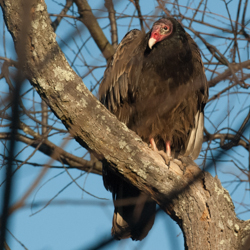Vol. 18 Issue 3, Fall 2013
by Katie Fallon

Photo by Nicole Hamilton
The bird had a warm, musty smell – like old leather with just a hint of rot. Despite being emaciated and weak, I struggled to keep the powerful wings folded against its body. I hugged the squirming vulture against my chest, careful to keep hold of its head; vultures often attempt to bite – and wouldn’t you, if the situation was reversed?
The nonprofit I co-founded, the Avian Conservation Center of Appalachia, works to conserve wild birds through research, education and rehabilitation. We treat more than 150 birds a year, including my favorite species: the Turkey Vulture. The bird in my arms suffered soft-tissue injuries after being shot; miraculously, none of the four pellets had broken any bones, and after recuperating for a few weeks in our rehabilitation center, the vulture should be able to return to the wild. Our veterinarian examined the bird and found small wounds where the pellets entered. The tissue around the wounds was green – the color birds bruise.
Despite the fact that Turkey Vultures eat only dead things – carrion – people still fear them, and sometimes intentionally harm these gentle and important members of our ecosystem. Avian scavengers play a vital role in healthy environments worldwide. In addition to cleaning up our highways and fields, they stop the spread of diseases, such as anthrax and neutralize dangerous pathogens like botulism toxin. If vultures are absent from an environment, mammalian scavengers, including rats and feral dogs, may fill the void, and thus contribute to the spread of rabies and other diseases. This scenario is playing out now in India; there, vultures have nearly disappeared due to a veterinary pharmaceutical used to treat cattle. The birds eat dead cows that had been treated with the drug and then die of kidney failure. Due to the recent loss of most of the country’s vultures, other scavengers are thriving, and incidences of rabies have increased. According to the World Health Organization, “roughly 36% of the world’s rabies deaths occur in India each year, most of those when children come into contact with infected dogs.” The Asian Whitebacked Vulture was once the most numerous birds of prey in the world; now, despite a ban on the drug, it is critically endangered, and many biologists fear its extinction.
It is difficult to imagine what Virginia would look like without vultures. How many deer would rot on the sides of highways? What cascading effects would the loss of vultures have on our ecosystems and perhaps our health? At the moment, Virginia’s vultures appear to be thriving, but that doesn’t diminish their importance.
After examining our patient, we placed it in a small enclosure to recuperate. I slid a dead rat to the bird, and it delicately hooked it with his beak, pulled it closer, then turned its back to me while it dined. In a few weeks we hoped we’d be able to return this vulture to the skies, where it would again fill the important role of the purifier of the environment we share.
Katie Fallon is the author of Cerulean Blues and co-founder of the Avian Conservation Center of Appalachia.

